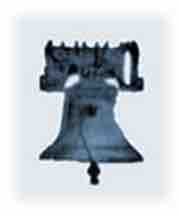The Populist Party, also known as the "People's Party," was a short-lived political party in the United States established in 1891 during the Populist movement. It was most important from 1892 to 1896, then rapidly faded away. Based among poor, white cotton farmers in the South (especially in North Carolina, Alabama, and Texas) and hard-pressed wheat farmers in the plains states (especially in Kansas and Nebraska), the party represented a radical crusading form of agrarianism and hostility to banks, railroads, and elites in general. It sometimes formed coalitions with labor unions, and in 1896, the Democrats endorsed the party's presidential nominee, William Jennings Bryan. The terms "populist" and "populism" are commonly used for antielitist appeals against established interests and mainstream parties.
The party flourished most among farmers in the Southwest and Great Plains, and made significant gains in the South, where it faced an uphill battle given the firmly entrenched monopoly of the Democratic Party. Success often was obtained through electoral fusion with the Democrats outside the South, and through alliances with the Republicans in Southern states such as Alabama, North Carolina, Tennessee, and Texas.
Political Platform
The drive to create a new political party out of the movement arose from the belief that the two major parties, Democrats and Republicans, were controlled by bankers, landowners, and elites hostile to the needs of the small farmer. The movement reached its peak in 1892 when the party held a convention chaired by Frances Willard (leader of the Woman's Christian Temperance Union) in Omaha, Nebraska, and nominated candidates for the national election.
The party's platform, commonly known as the "Omaha Platform," called for the abolition of national banks, a graduated income tax, direct election of senators, civil service reform, a working day of eight hours, and government control of all railroads, telegraphs, and telephones. In the 1892 presidential election, James B. Weaver received 1,027,329 votes. Weaver carried four states (Colorado, Kansas, Idaho, and Nevada) and received electoral votes from Oregon and North Dakota as well.
Populism and Race
Some Southern Populists, including Thomas E. Watson of Georgia, openly talked of the need for poor blacks and poor whites to set aside their racial differences in the name of shared economic interests. Regardless of these rhetoric appeals, however, racism was present in the Populist Party. Prominent Populist Party leaders such as Marion Butler, a U.S. senator from North Carolina, at least partially demonstrated a dedication to the cause of white supremacy, and there appears to have been some support for this viewpoint among the rank-and-file of the party's membership. After 1900, Watson himself became an outspoken white supremacist and became the party's presidential nominee in 1904 and 1908, winning 117,000 and 29,000 votes.
National Election
By 1896, the Democratic Party took up many of the Populist Party's causes at the national level, and the party began to fade from national prominence. In that year's presidential election, the Democrats nominated William Jennings Bryan, who focused on the free silver issue as a solution to the economic depression and the maldistribution of power.
The Populist movement coincided with the Third Great Awakening, characterized by pietistic Protestant denominations, and Bryan was a devout Presbyterian who was a strong supporter of temperance and opposed Darwinism. His campaign kicked off in October 1921, when the Union Theological Seminary in Richmond, Virginia, invited Bryan to deliver the James Sprunt Lectures. At the presentation's heart was a lecture entitled, "The Origin of Man" in which Bryan asked, "what is the role of man in the universe and what is the purpose of man?" For Bryan, the Bible was absolutely central to answering this question, and moral responsibility and the spirit of brotherhood could only rest on belief in God.
The Populists had the choice of endorsing Bryan or running their own candidate. After great infighting at their St. Louis convention, they decided to endorse Bryan but with their own vice-presidential nominee, Thomas E. Watson of Georgia. Watson was cautiously open to cooperation, but after the election, he recanted any hope in the possibility of cooperation as a viable tool. Bryan's strength was based on the traditional Democratic vote (minus the middle class and the Germans); he swept the old Populist strongholds in the West and South, and added the Silverite states in the West, but he did poorly in the industrial heartland. He lost to Republican William McKinley by a margin of 600,000 votes, losing again in a 1900 rematch by a larger margin.
William Jennings Bryan
In 1896, the 36-year-old William Jennings Bryan was the chosen candidate resulting from the fusion of the Democrats and the Populist Party.
Decline
Fusion with the Democrats was disastrous to the Populist Party in the South. The Populist/Republican alliance that had governed North Carolina fell apart in the only state in which it had enjoyed any success. By 1898, the Democrats were using a violently racist campaign to defeat the North Carolina Populists and GOP, and in 1900, the Democrats ushered in disfranchisement. Populism never recovered from the failure of 1896. For example, Tennessee's Populist Party was demoralized by a diminishing membership, and became puzzled and divided by the dilemma of whether to fight the state-level enemy (the Democrats) or the national foe (the Republicans and Wall Street).
In 1900, while many Populist voters supported Bryan again, the weakened party nominated a separate ticket of Wharton Barker and Ignatius L. Donnelly, and disbanded afterward. Populist activists either retired from politics, joined a major party, or followed Eugene Debs into his new Socialist Party.
In 1904, the party was reorganized, and Thomas E. Watson became the nominee for president in 1904 and in 1908, after which the party disbanded again.

Populist Party logo
This image shows the Populist Party logo of a bell.